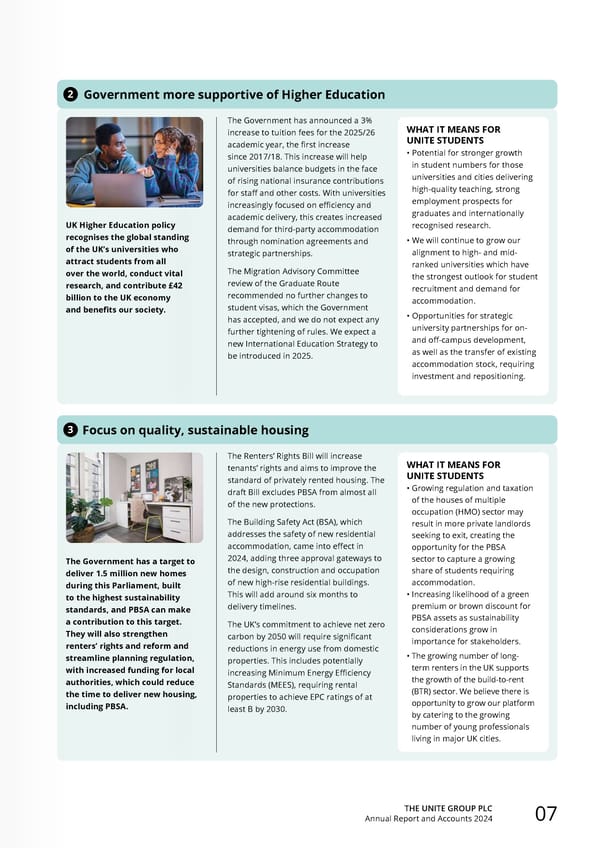THE UNITE GROUP PLC Annual Report and Accounts 2024 07 UK Higher Education policy recognises the global standing of the UK’s universities who attract students from all over the world, conduct vital research, and contribute £42 billion to the UK economy and benefits our society. Government more supportive of Higher Education 2 WHAT IT MEANS FOR UNITE STUDENTS • Potential for stronger growth in student numbers for those universities and cities delivering high-quality teaching, strong employment prospects for graduates and internationally recognised research. • We will continue to grow our alignment to high- and mid- ranked universities which have the strongest outlook for student recruitment and demand for accommodation. • Opportunities for strategic university partnerships for on- and off-campus development, as well as the transfer of existing accommodation stock, requiring investment and repositioning. The Government has announced a 3% increase to tuition fees for the 2025/26 academic year, the first increase since 2017/18. This increase will help universities balance budgets in the face of rising national insurance contributions for staff and other costs. With universities increasingly focused on efficiency and academic delivery, this creates increased demand for third-party accommodation through nomination agreements and strategic partnerships. The Migration Advisory Committee review of the Graduate Route recommended no further changes to student visas, which the Government has accepted, and we do not expect any further tightening of rules. We expect a new International Education Strategy to be introduced in 2025. Focus on quality, sustainable housing The Renters’ Rights Bill will increase tenants’ rights and aims to improve the standard of privately rented housing. The draft Bill excludes PBSA from almost all of the new protections. The Building Safety Act (BSA), which addresses the safety of new residential accommodation, came into effect in 2024, adding three approval gateways to the design, construction and occupation of new high-rise residential buildings. This will add around six months to delivery timelines. The UK’s commitment to achieve net zero carbon by 2050 will require significant reductions in energy use from domestic properties. This includes potentially increasing Minimum Energy Efficiency Standards (MEES), requiring rental properties to achieve EPC ratings of at least B by 2030. 3 The Government has a target to deliver 1.5 million new homes during this Parliament, built to the highest sustainability standards, and PBSA can make a contribution to this target. They will also strengthen renters’ rights and reform and streamline planning regulation, with increased funding for local authorities, which could reduce the time to deliver new housing, including PBSA. WHAT IT MEANS FOR UNITE STUDENTS • Growing regulation and taxation of the houses of multiple occupation (HMO) sector may result in more private landlords seeking to exit, creating the opportunity for the PBSA sector to capture a growing share of students requiring accommodation. • Increasing likelihood of a green premium or brown discount for PBSA assets as sustainability considerations grow in importance for stakeholders. • The growing number of long- term renters in the UK supports the growth of the build-to-rent (BTR) sector. We believe there is opportunity to grow our platform by catering to the growing number of young professionals living in major UK cities.
 Home for Success: Unite Students Annual Report 2024 Page 8 Page 10
Home for Success: Unite Students Annual Report 2024 Page 8 Page 10